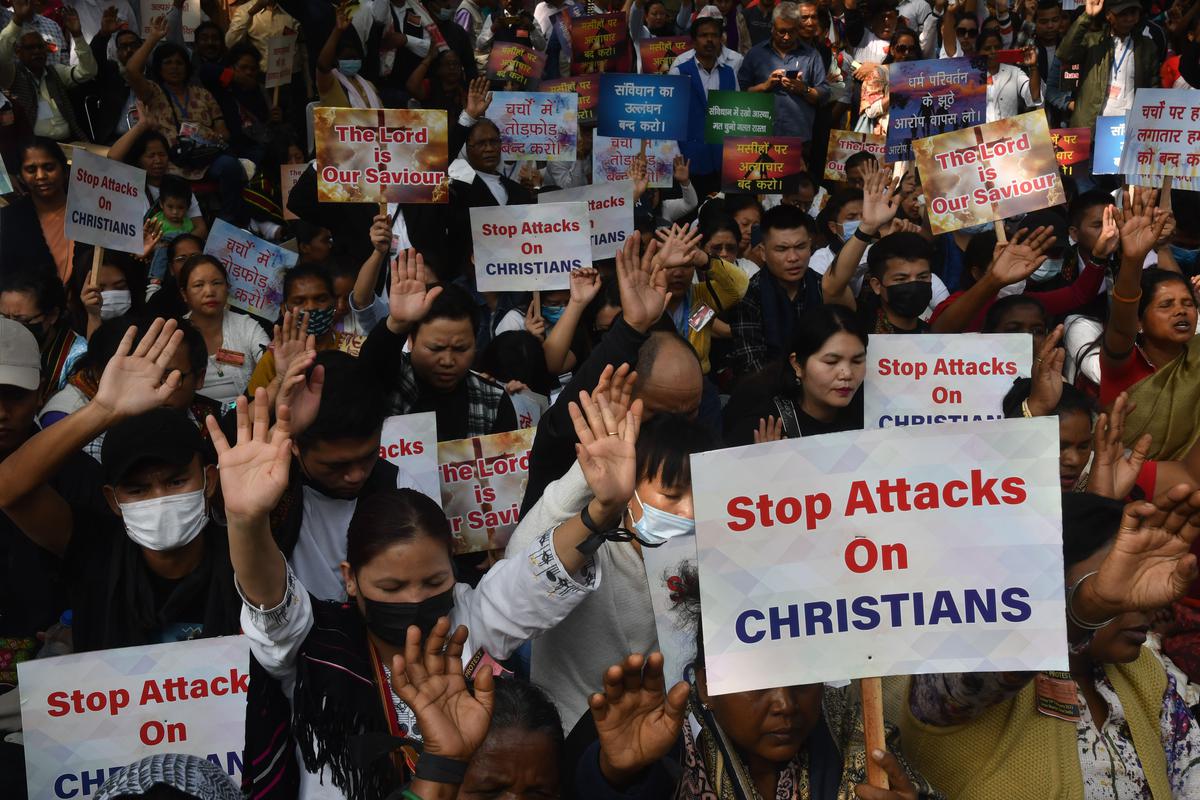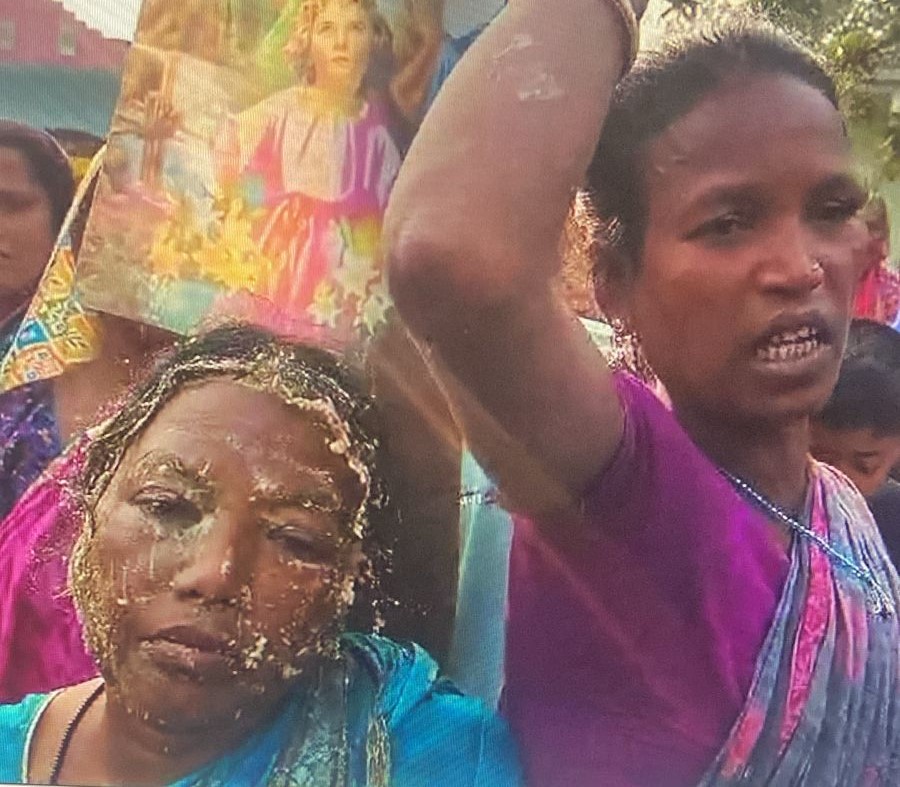Christmas in Fear: The Dark Side of Holiday Celebrations for Christians in India

Poonam Masih, TwoCircles.net
As the festive season Christmas ushers in a sense of joy and togetherness for millions, for many Christians in India, it has become a time of fear, hostility and violence. Its celebrations and other Christian holidays in recent years have been marred by a surge in attacks allegedly from Hindutva groups, leading to a heightened sense of insecurity among the community. What was once a time of celebration now often feels like a test of endurance and survival.
During the Christmas celebrations in Lucknow, a group of Iskcon devotees chanting “Hare Ram” and “Hare Krishna” allegedly stood in front of a cathedral and provoked tension. Meanwhile, in Odisha, two Christian women from the Balasore district were brutally attacked reportedly by a Hindutva group a day after Christmas on allegations of forced conversion. One of the survivors is said to be in critical condition and currently hospitalised in Balasore.
This wave of violence continued to spread across the country. In Rajasthan, protests erupted in Jaisalmer and Jodhpur, where activists from the Vishwa Hindu Parishad (VHP) and the Bajrang Dal purportedly targeted schools celebrating Christmas. The accusations ranged from promoting religious conversions to destroying Christmas event posters and confronting students and teachers with open hostility. Meanwhile, in Mathura, Uttar Pradesh, the dressing of Lord Laddu Gopal’s idol in a Christmas outfit became a lightning rod for right-wing groups, which condemned the act as an assault on Hindu traditions.

In Punjab's Ludhiana district, a local political leader, Sonu Singh Rajput, allegedly confronted a Christian pastor who was conducting prayers in a private home. The pastor was accused of attempting to convert others. This attack, framed as “protecting traditions", epitomises the broader issue of how religious minorities, especially Christians, are increasingly targeted during the holiday season.
For the past 10-15 years, Hindutva groups have escalated their harassment of Christians during Christmas. What was once a time of family gatherings and joyous celebrations has increasingly become a season marked by fear and intimidation.
A Changing Atmosphere: Fear and Vigilance Amid Festivities
In the age of social media, the Christian community has been "increasingly targeted" by groups spreading inflammatory content. The rise of such online hate, combined with a rising number of real-world attacks, has created an environment of apprehension, where many are afraid to celebrate freely. The joyous spirit of Christmas is now overshadowed by the palpable anxiety of potential violence.
Anil Thadathil, a pastor from Delhi, shared his experience. “Earlier, we used to go caroling, singing and performing skits on the streets. We used to visit people’s homes. But three years ago, we were attacked by Hindutva groups, and an FIR was filed against us for ‘conversion activities'. Since then, we have stopped caroling outside. This year, I organised a small carol in my society, and after I invited people to join, a message was sent in our WhatsApp group, saying we were forgetting the sacrifices of Sikh Gurus while celebrating Christmas.”
Anil reflects on the changing dynamics: “After the carol incidents, I noticed a shift in how people treated us. Christmas is no longer just a Christian festival. It is a time when everyone, regardless of faith, comes together to celebrate the birth of Jesus. But now, it is not the same.”
Rising Incidents: A Surge in Attacks on Christians
According to the United Christian Forum (UCF), recorded incidents of attacks against Christians in India have quadrupled between 2012 and 2022. In 2022, a staggering 599 incidents were reported, a sharp increase from 247 in 2016. The UCF’s 2023 report documented 733 attacks, averaging 61 incidents per month. Uttar Pradesh and Chhattisgarh were among the worst-hit states, accounting for 191 and 158 incidents respectively, with many victims suffering from attacks during prayer services or illegal arrests made by local police.
Dr. Goldy George, a social scientist, says, “In the last 15 years, we have seen Hindutva groups increasingly targeting Christian festivals, linking them to Hindu gods and goddesses. For example, Tulsi Day was suddenly declared on Christmas Day. It is all part of a narrative that Christmas and Christianity are foreign imports. This idea was spread by the RSS and further reinforced through social media campaigns.”
He further elaborates on the growing fear, particularly among Christians in tribal areas: “In places like Chhattisgarh, there is now a palpable atmosphere of fear. Many Christians in tribal regions are too afraid to even go to church, remembering the violence that took place during Christmas two years ago. The issue of delisting tribals and turning them against Christian communities has further fueled this climate of tension.”
The Strain of Living in Fear
Priti (name changed), a young Christian from Haridwar, shares her growing unease. “Two years ago, our church was attacked by a Hindutva group, which destroyed everything inside. They fought with church members, and the case is still in court. Even now, we receive regular threats regarding the case.”
The fear is so intense that even during regular church services, Priti finds it difficult to relax. “When I attend church on Sundays, I cannot focus fully. I am always on edge, worried that someone might attack again. We cannot even celebrate our own festival peacefully.”
A Call for Justice: Unanswered Appeals
In the wake of these frequent assaults, the United Christian Forum has been vocal in its demand for justice. In 2023, it presented a memorandum to Prime Minister Narendra Modi and urged him to take stronger action against those targeting Christians during religious festivals.
Despite the urgency of these matters, when the UCF reached out to National Commission for Minorities Chairperson Iqbal Singh Lalpur regarding these issues, their request for a formal discussion was allegedly met with delays. The office, when contacted, allegedly failed to address the serious concerns raised about the attacks on Christians during Christmas. It further added to the community’s frustration and sense of abandonment.
